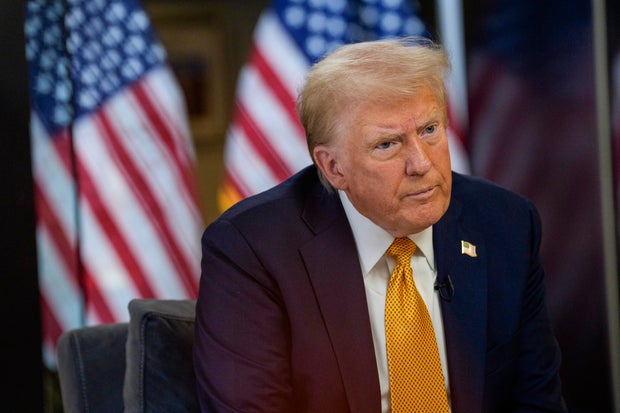Behind Trump’s promises in new interview
Washington — President-elect Donald Trump says he’ll end birthright citizenship, after years of criticizing the constitutional right.
In an interview on NBC’s “Meet the Press” that aired Sunday, Trump said he’s “absolutely” still planning to end birthright citizenship on Day One of his presidency. “We have to end it,” Trump told host Kristen Welker. In a video post in 2023, Trump had said he’d sign an executive action to do so on the first day in office.
What is birthright citizenship, and is it in the U.S. Constitution?
Birthright citizenship automatically grants citizenship to anyone born on U.S. soil, regardless of the parents’ citizenship status.
The Citizen Clause, under the 14th Amendment to the Constitution, states that “all persons born or naturalized in the United States, and subject to the jurisdiction thereof, are citizens of the United States and of the State wherein they reside.”
Congress passed the 14th Amendment in 1866, during the Reconstruction period following the Civil War. In 1868, the amendment was ratified to extend citizenship to people born on U.S. soil, invalidating the Supreme Court’s Dred Scott decision, which barred slaves and descendants of slaves from becoming citizens.
Why does Trump want to end birthright citizenship?
Trump has been talking about ending birthright citizenship since his presidential campaign in 2015. In a policy paper at the time, he called birthright citizenship “the biggest magnet for illegal immigration.” In the 2023 video, Trump blamed birthright citizenship for “birth tourism,” in which he said migrants spend the final weeks of their pregnancies in hotels in order to give birth in the U.S. and then use the child’s citizenship status to bring relatives into the U.S. through “chain migration,” also known as family-based migration.
During his first term, Trump pledged to end birthright citizenship but did not do so. He told “Meet the Press” that he had planned to sign an executive action on birthright citizenship before his focus turned to fighting COVID-19.

Trump called the guarantee of citizenship by birth “ridiculous,” telling Welker that the U.S. is the only country with birthright citizenship. In fact, dozens of other countries have birthright citizenship.
“If somebody sets a foot — just a foot, one foot, you don’t need two — on our land, congratulations, you are now a citizen of the United States of America,” Trump complained. “We’re going to end that because it’s ridiculous.”
Opponents of birthright citizenship say it was never intended to cover undocumented immigrants’ children or so-called “birth tourism.” They contend the amendment was ratified to eliminate barriers to birthright citizenship based on race.
More broadly, the pledge is part of what Trump has billed as a radical shift on immigration that he campaigned on, part of a promise to target both unauthorized and legal immigrants using unprecedented measures likely to test the limits on his authority.
Can Trump end birthright citizenship?
When asked whether he could get around the 14th Amendment through executive action, Trump acknowledged “it would maybe have to go back to the people, but we have to end it,” which seemed to indicate he might try to initiate a constitutional amendment to end the right, if necessary. He clarified that he would pursue an end to birthright citizenship through executive action “if we can.”
Could Trump repeal birthright citizenship through executive action?
“The answer is no,” said Michael LeRoy, professor at the University of Illinois at Urbana-Champaign School of Labor and Employment Relations and College of Law. That’s because the president lacks the authority to unilaterally change the Constitution.
Eliminating birthright citizenship through a constitutional amendment would be nearly impossible as well, because of the widespread approval needed not only from Congress but also from the states.
What’s enshrined in the Constitution can’t be altered by a regular congressional vote, either. Amendments not only have to be approved by a two-thirds vote in both chambers of Congress, but ratified by three-fourths of state legislatures, or three-fourths of conventions called in each state for ratification. It’s an extensive process with a high bar.
The only time in U.S. history a constitutional amendment has been repealed was when the 18th Amendment prohibiting the manufacture, sale and transportation of intoxication liquors, better known as prohibition, was repealed in 1933 through the addition of the 21st Amendment, LeRoy noted.
Republican Sen. Lindsey Graham of South Carolina says he’s working on drafting a constitutional amendment to end the practice.
Do other countries besides the U.S. have birthright citizenship?
The U.S. is far from the only country with birthright citizenship, although birthright citizenship without conditions is more common in North and South America than it is in the rest of the world.
Unlike some countries, the U.S. does not require a parent to be a citizen for a child born on U.S. soil to become a citizen. It’s automatic.
Full list of countries with birthright citizenship
More than 30 countries have birthright citizenship, according to the Central Intelligence Agency’s World Factbook. They include:
- Antigua and Barbuda
- Argentina
- Azerbaijan
- Barbados
- Belize
- Bolivia
- Brazil
- Canada
- Chile
- Costa Rica
- Cuba
- Dominica
- Ecuador
- El Salvador
- The Gambia
- Grenada
- Guatemala
- Guinea-Bissau
- Guyana
- Honduras
- Jamaica
- Lesotho
- Mauritius
- Mexico
- Nepal
- Nicaragua
- Pakistan
- Panama
- Paraguay
- Peru
- Saint Kitts and Nevis
- Saint Lucia
- Saint Vincent and the Grenadines
- Trinidad and Tobago
- Tuvalu
- United States
- Uruguay
- Venezuela
Kaia Hubbard is a politics reporter for CBS News Digital, based in Washington, D.C.


